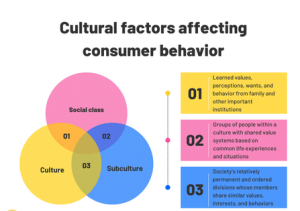Cultural distinctions significantly influence foreign consumer behavior, shaping the way individuals in different cultures perceive, evaluate, and respond to products and marketing strategies. Understanding these cultural nuances is crucial for businesses seeking to enter and succeed in international markets. Here are key cultural distinctions that impact foreign consumer behavior:

Cultural Distinctions on Foreign Consumer Behavior
-
Table of Contents
ToggleCultural Values and Beliefs:
- Cultural values and beliefs shape individuals’ preferences, priorities, and decision-making processes. For example, cultures with a strong emphasis on individualism may prioritize personal choice and self-expression, while collectivist cultures may prioritize group harmony and conformity.
-
Social Norms and Customs:
- Social norms influence what is considered acceptable or appropriate behavior in a given culture. Understanding cultural customs and norms helps businesses tailor their products and marketing messages to align with local expectations.
-
Communication Styles:
- Cultural variations in communication styles affect how consumers respond to advertising and promotional efforts. High-context cultures, where communication relies heavily on non-verbal cues and context, may interpret messages differently than low-context cultures that rely more on explicit communication.
-
Perceptions of Time:
- Different cultures have varying attitudes toward time. Some cultures may prioritize punctuality and view time as linear (monochronic), while others may have a more flexible approach to time and view it as cyclical (polychronic). Understanding these differences is crucial for scheduling promotions and meetings.
-
Aesthetics and Design Preferences:
- Aesthetic preferences can vary widely across cultures. Colors, symbols, and design elements that are considered attractive or auspicious in one culture may have different connotations in another. Adapting product designs and packaging to align with local aesthetic preferences is essential.
-
Cultural Symbols and Meanings:
- Cultural symbols and meanings can impact consumer perceptions. Companies need to be aware of the cultural significance of symbols, colors, and gestures to avoid unintentional misinterpretations or offense.
-
Attitudes Toward Risk:
- Cultural attitudes toward risk influence consumer behavior, particularly in purchasing decisions. Some cultures may be more risk-averse and prefer established brands, while others may be more open to trying new products and innovations.
-
Family Structure and Roles:
- Family plays a central role in many cultures, and family structures and roles can influence consumer decisions. Understanding who holds decision-making power within a family and the roles of different family members in the purchase process is important for effective marketing.
-
Religious Influences:
- Religious beliefs can impact consumer behavior, influencing preferences for certain products, dietary choices, and lifestyle decisions. Adapting marketing messages to align with or respect local religious beliefs is crucial.
-
Shopping Behavior:
- Cultural differences can manifest in shopping behavior, including preferences for online versus offline shopping, frequency of shopping trips, and the importance of social interactions during the shopping process.
-
Perceptions of Luxury and Status:
- The concept of luxury and status symbols varies across cultures. While some cultures may prioritize conspicuous consumption, others may value subtlety and understatement. Understanding these differences is vital for positioning products in the market.
-
Attitudes Toward Authority:
- Cultural attitudes toward authority and hierarchy can influence how consumers respond to marketing messages. In some cultures, appeals to authority figures may be effective, while in others, a more egalitarian approach may be preferred.
-
Societal Views on Gender:
- Societal views on gender roles and expectations can impact consumer preferences and purchasing decisions. Adapting marketing strategies to be inclusive and respectful of diverse gender perspectives is important.
In summary, cultural distinctions play a central role in shaping foreign consumer behavior. Businesses that invest in cultural intelligence and tailor their strategies to align with local cultural norms are better positioned to connect with consumers, build trust, and succeed in diverse international markets.
